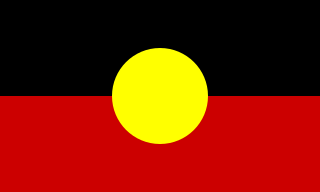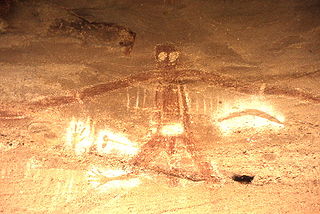Related Research Articles

Torres Strait Islanders are the Indigenous peoples of the Torres Strait Islands, which are part of the state of Queensland, Australia. Ethnically distinct from the Aboriginal people of the rest of Australia, they are often grouped with them as Indigenous Australians. Today there are many more Torres Strait Islander people living in mainland Australia than on the Islands.
Native title is the designation given to the common law doctrine of Aboriginal title in Australia, which is the recognition by Australian law that Indigenous Australians have rights and interests to their land that derive from their traditional laws and customs. The concept recognises that in certain cases there was and is a continued beneficial legal interest in land held by Indigenous peoples which survived the acquisition of radical title to the land by the Crown at the time of sovereignty. Native title can co-exist with non-Aboriginal proprietary rights and in some cases different Aboriginal groups can exercise their native title over the same land.

Lowitja Lois O'Donoghue Smart, AC, CBE, DSG is an Aboriginal Australian retired public administrator. In 1990-1996 she was the inaugural chairperson of the Aboriginal and Torres Strait Islander Commission (ATSIC). She is patron of the Lowitja Institute, a research institute for Aboriginal & Torres Strait Islander health and wellbeing.
Reconciliation Australia is a non-government, not-for-profit foundation established in January 2001 to promote a continuing national focus for reconciliation between Indigenous and non-Indigenous Australians. It was established by the Council for Aboriginal Reconciliation, which was established to create a framework for furthering a government policy of reconciliation in Australia.

Aboriginal Australians are the various Indigenous peoples of the Australian mainland and many of its islands, such as Tasmania, Fraser Island, Hinchinbrook Island, the Tiwi Islands, and Groote Eylandt, but excluding the Torres Strait Islands. The term Indigenous Australians refers to Aboriginal Australians and Torres Strait Islanders collectively. It is generally used when both groups are included in the topic being addressed. Torres Strait Islanders are ethnically and culturally distinct, despite extensive cultural exchange with some of the Aboriginal groups. The Torres Strait Islands are mostly part of Queensland but have a separate governmental status.
Australia legally has no official language. However, English is by far the most commonly spoken and has been entrenched as the de facto national language since European settlement. Australian English is a major variety of the English language with a distinctive pronunciation and lexicon, and differs slightly from other varieties of English in grammar and spelling. General Australian serves as the standard dialect.

Moa Island, also called Banks Island, is an island of the Torres Strait Islands archipelago that is located 40 kilometres (25 mi) north of Thursday Island in the Banks Channel of Torres Strait, Queensland, Australia. It is also a locality within the Torres Strait Island Region local government area. This island is the largest within the "Near Western" group. It has two towns, Kubin on the south-west coast and St Pauls on the east coast, which are connected by bitumen and a gravel road. In the 2016 census, Moa Island had a population of 448 people.
The Encyclopaedia of Aboriginal Australia: Aboriginal and Torres Strait Islander history, society and culture, edited by David Horton, is an encyclopaedia published by the Aboriginal Studies Press at the Australian Institute of Aboriginal and Torres Strait Islander Studies (AIATSIS) in 1994 and available in two volumes or on CD-ROM covering all aspects of Indigenous Australians lives and world. There are 2000 entries and 1000 photographs, with the CD-ROM having 250 sound items and 40 videos.
Indigenous Australians or Australian First Nations are people with familial heritage from, and membership in, the ethnic groups that lived in Australia before British colonisation. They include the Aboriginal and Torres Strait Islander peoples of Australia. The term Aboriginal and Torres Strait Islander peoples or the person's specific cultural group, is often preferred, though the terms First Nations of Australia, First Peoples of Australia and First Australians are also increasingly common.

An Australian Aboriginal sacred site is a place deemed significant and meaningful by Aboriginal Australians based on their beliefs. It may include any feature in the landscape, and in coastal areas, these may lie underwater. The site's status is derived from an association with some aspect of social and cultural tradition, which is related to ancestral beings, collectively known as Dreamtime, who created both physical and social aspects of the world. The site may have its access restricted based on gender, clan or other Aboriginal grouping, or other factors.
Indigenous Australians are both convicted of crimes and imprisoned at a disproportionately higher rate in Australia, as well as being over-represented as victims of crime. As of September 2019, Aboriginal and Torres Strait Islander prisoners represented 28% of the total adult prisoner population, while accounting for 2% of the general adult population. Various explanations have been given for this over-representation, both historical and more recent. Federal and state governments and Indigenous groups have responded with various analyses, programs and measures.
Indigenous land rights in Australia, also known as Aboriginal land rights in Australia, relate to the rights and interests in land of Aboriginal and Torres Strait Islander people in Australia, and the term may also include the struggle for those rights. Connection to the land and waters is vital in Australian Aboriginal culture and to that of Torres Strait Islander people, and there has been a long battle to gain legal and moral recognition of ownership of the lands and waters occupied by the many peoples prior to colonisation of Australia starting in 1788, and the annexation of the Torres Strait Islands by the colony of Queensland in the 1870s.
Indigenous health in Australia examines health and wellbeing indicators of Indigenous Australians compared with the rest of the population. Statistics indicate that Aboriginal Australians and Torres Strait Islanders are much less healthy than other Australians. Various government strategies have been put into place to try to remediate the problem; there has been some improvement in several areas, but statistics between Indigenous Australians and the rest of the Australian population still show unacceptable levels of difference.
The Closing the Gap framework is an Australian government strategy that aims to reduce disadvantage among Aboriginal and Torres Strait Islander people, based on seven targets. From adoption in 2008, after meetings with the Close the Gap social justice campaign, until 2018, the federal and state and territory governments worked together via the Council of Australian Governments (COAG) on the framework, with the Department of the Prime Minister and Cabinet producing a report at the end of each year analysing progress on each of its seven targets.

Dauan Island is an island in the Torres Strait, Queensland, Australia; it is also known as Cornwallis Island. Dauan Island is also a town and locality in the Torres Strait Island Region, Queensland, Australia. In the 2016 census the locality of Dauan Island had a population of 191 people.

A Custody Notification Service (CNS), sometimes referred to as a Custody Notification Scheme, is a 24-hour legal advice and support telephone hotline for any Indigenous Australian person brought into custody, connecting them with lawyers from the Aboriginal legal service operating in their state or territory. It is intended to reduce the high number of Aboriginal deaths in custody by counteracting the effects of institutional racism. Legislation mandating the police to inform the legal service whenever an Aboriginal or Torres Strait Islander person is brought into custody is seen as essential to ensure compliance and a clear record of events. Where Custody Notification Services have been implemented, there have been reductions in the numbers of Aboriginal deaths in custody.

MaryAnn Bin-Sallik is Djaru Elder and Australian academic, specialising in Indigenous studies and culture. She was the first Indigenous Australian to gain a doctorate from Harvard University.
Patricia Audrey Anderson is an Australian human rights advocate and health administrator. An Alyawarre woman from the Northern Territory, she is well known internationally as a social justice advocate, advocating for improved health, and educational and protection outcomes for Indigenous Australian children.

Masig Island is an island and locality in the Torres Strait Island Region, Queensland, Australia. In the 2016 census Masig Island had a population of 270 people.
Pat Dudgeon is an Aboriginal psychologist, Fellow of the Australian Psychological Society and a research professor at the University of Western Australia's (UWA) School of Indigenous Studies. Her area of research includes Indigenous social and emotional wellbeing and suicide prevention. She is actively involved with the Aboriginal community, having an ongoing commitment to social justice for Indigenous people. Dudgeon has participated in numerous state and national committees, councils, task groups and community service activities in both a voluntary and professional capacity.
References
- ↑ Snow, Dudley; Western Australia. Public Health Department (1981), The progress of public health in Western Australia, 1829-1977, Public Health Dept. : distributed by University of Western Australia Press, ISBN 978-0-7244-8478-2
- ↑ "AU WA A36 - Health Department of Western Australia". State Records Office of Western Australia. Retrieved 4 June 2018.
- ↑ "Alteration of Statutory Designations Order (No. 3) 2001" (PDF). Western Australia Government Gazette. 7 September 2001. p. 4995.
